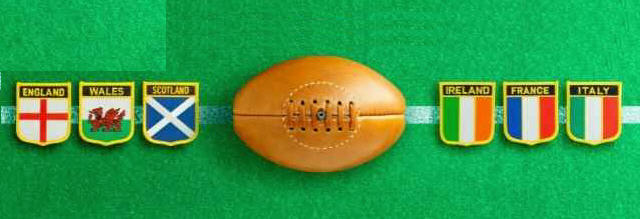Extra time, overtime, and injury time in rugby are often confused with each other. Even commentators may use one term when they mean another.
I’ll start with some brief definitions. The rest of the article goes into detail, with examples from famous matches.
Extra Time, Over Time, And Injury Time In Rugby

Extra time in rugby is a way of ensuring that there is a clear winner when a match ends in a draw.
Overtime refers to the period when the regulation time is over, but play goes on until there is a natural stoppage.
Injury time is the additional time over the regulation 40 minute half that referees may award at their discretion.
Simple, right? Well, there’s a bit more to it. Read on…
Most Rugby Matches Don’t Have Extra Time
Some rugby tournaments never have extra time. When a match ends in a draw, equal points are awarded to each team.
The Six Nations is probably the most famous example.
Most matches in club league competitions will not have extra time during the usual season. However, they may introduce the extra time format during play-offs and knockout matches.
The biggest tournament, the World Cup, doesn’t use extra time in pool rounds. But after the pools, matches move to a knock-out format.
Not all rugby competitions use the same format for extra time.
So I’ll start with an explanation of the rules for the World Cup.
How Does Extra Time Work In The Rugby Union World Cup?

Draws are rare in rugby due to different points for different types of scoring. There have only been three drawn matches since the first World Cup in 1987, but two of those matches were finals.
In 1995, South Africa ended level with New Zealand in the regulation time. England and Australia were tied in 2003.
The rules start with twenty minutes of extra time in a knockout match. That is ten minutes each way i.e. the players change halves after the first ten minutes.
The interval is five minutes, and the players stay on the field.
Drop goals win matches
In 1995, Joel Stransky kicked a drop-goal to win the match in extra time for South Africa. This is the famous final when Nelson Mandela wore the number 6 Springbok shirt.
In 2003, Jonny Wilkinson became a rugby legend when he landed the extra time drop goal to win the trophy for England.
Rugby sudden death
What happens if the scores are still level after extra time?
In some sports tournaments, play continues indefinitely until there is a clear winner. Wimbledon finals have produced marathon final sets. But that wasn’t considered appropriate for the Rugby World Cup.
In the World Cup, the game stops with another interval. Then play starts again as ten minutes of sudden death.
This means that the first score wins the game. That can be a try, a penalty, or a drop goal.
Rugby Penalty Shootouts After Extra Time

What happens if there is no score during sudden death?
To get to this point is very rare. The outcome is a competition of penalty kicks.
I only remember watching a kicking decider once. That was Cardiff Blues versus Leicester Tigers in the 2009 European Cup semi-final.
I’ve read that the one other example was in the Junior World Championship (which was since renamed as the U20 World Cup). The match was a semi-final in 2010 between Argentina and Wales.
The rules for the World Cup are that five players from each team take turns to kick for the posts from the 22-meter line.
Crucially, only players who were on the field at the end of sudden death can take the kicks. So the starting out-half (usually the best placekicker) may not even be part of this phase.
If the teams are still level after the round of five kicks each, then it moves to sudden death.
The penalty shootout is not universally liked
Personally, I dislike the kicking shoot-out as a way of deciding a rugby match. Place kicking is a niche skill that most players (i.e. the forwards) do not practice. It’s such an arbitrary choice.
Why not make the backs scrum against each other instead? Or throw up a ball between two props and make them run and jump for it? The latter policy might be amusing!
How Does Overtime Work In Rugby Union?
In soccer, the referee blows the whistle when the regulation time is up. It doesn’t matter if play is in full flow or the ball is sailing over the keeper’s head. If the ball hasn’t hit the back of the net on the whistle, the score isn’t allowed.
Rugby is different. When the referee decides that the regulation time is over, play continues until there is a natural stoppage. Then the match is over.
“Overtime” is popular usage for this period. But it’s not an official term. You’ll also hear commentators refer to the clock being “in the red”.
What is a natural stoppage?
A natural stoppage may be the ball going dead by crossing the sideline or a player knocking on. Normally, the opposition is awarded a lineout or a scrum. In these cases, the match is over.
If the referee awards a penalty during this period, play can continue. The team with the penalty has a choice. They can choose to tap and run the ball or kick the ball out for a lineout.
But when a team is leading in this position, they usually want the game to end. They’ll take the option to tap the ball and kick it out over the sideline.
This means the ball has gone dead, and the match is over.
How Long Is Overtime In Rugby

The overtime period tends to last no more than a few minutes.
But In theory, it could go on indefinitely.
Let’s say that the defending team keeps giving away a penalty. The team in possession can choose to keep restarting play.
However, the referee should give yellow cards for persistent infringement. So, this kind of continuous overtime should see the defending team lose player after player with each concession of a penalty.
Eventually, the attacking team should get the ball over the try-line with sheer advantage of numbers.
And that means the ball has gone dead. The half is over after the conversion kick.
So, it’s unlikely you’ll get endless hours of overtime play. However, there have been some notable lengthy exceptions.
We’ll cover the longest known example next.
The Longest Rugby Overtime

A rugby match between France and Wales in the 2017 Six Nations produced twenty minutes of overtime at the end of the second half.
France was losing by five points when the clock went red. But they were camped deep in Welsh territory.
Bear in mind that a penalty kick (three points) wouldn’t have given the game to France. France needed a converted try to win.
So as Wales kept infringing, France kept alternating between quick taps and scrums to restart play. Eventually, twenty minutes after regulation time, Les Bleus triumphed!
There are several reasons why this overtime was so unusually long.
Scrum resets
Referee Wayne Barnes was widely criticized for the number of scrum resets allowed.
A scrum reset occurs when the referee decides there was no fault in a collapse or failed set-up. The alternative is to award a penalty (collapse) or a free kick (failure to pack down properly).
The problem with resets is that they can take over a minute to get to the point of engagement. If you’re curious, we have an article about how referees set the scrum.
Many saw the resets as a bit of a cop-out by the referee.
But Barnes is a decisive whistle-blower who had made crucial calls in other big games. For example, he issued a red card to Saints captain Dylan Hartley in the final of the English premiership league.
Wales continuing to infringe
At one point in overtime, France was awarded one of many penalties. Their scrumhalf took a quick tap but knocked the ball on.
Usually, that would be game over. But Barnes adjudicated that Wales hadn’t retreated ten meters, and gave another penalty to France.
To be fair to Barnes, he was undoubtedly right in that decision. France opted to take the scrum.
France does the hokey-cokey (badly)

One of the French props had already been sent off with a yellow card. So when France opted for a scrum, the regulations meant they had to bring on a substitute prop and send a sacrificial back to the bench.
There was considerable confusion on the sidelines between the match officials and the French backroom staff. What should have been a simple exchange of players took an age.
Meanwhile, the French players on the pitch had a nice little rest. So did the Welsh, but the situation was farcical.
I’d fault Barnes there for not getting a grip on proceedings.
French nibbles?
During overtime, the Welsh captain told Barnes that one of his players had been bitten.
Barnes referred the case to the TMO, a referee who rewatches play on the cameras.
TMOs often take a few looks at the same play from different angles. But this particular TMO was very meticulous.
Minutes went by as the footage was checked and re-checked for nothing at all.
Does Rugby Have Injury Time?
The referee has discretion to award additional time due to injuries and other stoppages during a half. The rules allow for up to a minute per injury.
Referees will stop and restart their time-keeping devices. They say “time off” and “time back on” to inform the players what’s happening.
Nowadays, television broadcasters have digital access to the referee’s timekeeping. This allows them to show viewers how much time is left in the match. However, that’s only been the case in recent years.
I well remember the commentators having to guess how much time a losing team had left to claw their way back to a winning score.
All Blacks versus Wales
Back in 2002, New Zealand was beating Wales by five points when the broadcaster’s clock went red.
There didn’t seem to have been a lot of injuries. So, the Welsh commentators kept saying “this will be the last piece of play”.
Nine minutes later, the All Blacks had racked up three tries when the referee blew his whistle.
And it doesn’t have to be injuries that result in prolonged injury time.
Australia versus New Zealand
In 2000, John Eales kicked the winning penalty for Australia to beat New Zealand. The broadcaster’s clock showed 5 minutes into the red.
The referee, Jonathan Kaplan, said he’d added injury time because the All Blacks were time-wasting when taking lineouts.
Naturally, this didn’t go down well with the losing side!
1 thought on “What Is Extra Time, Overtime, And Injury Time In Rugby?”
Comments are closed.